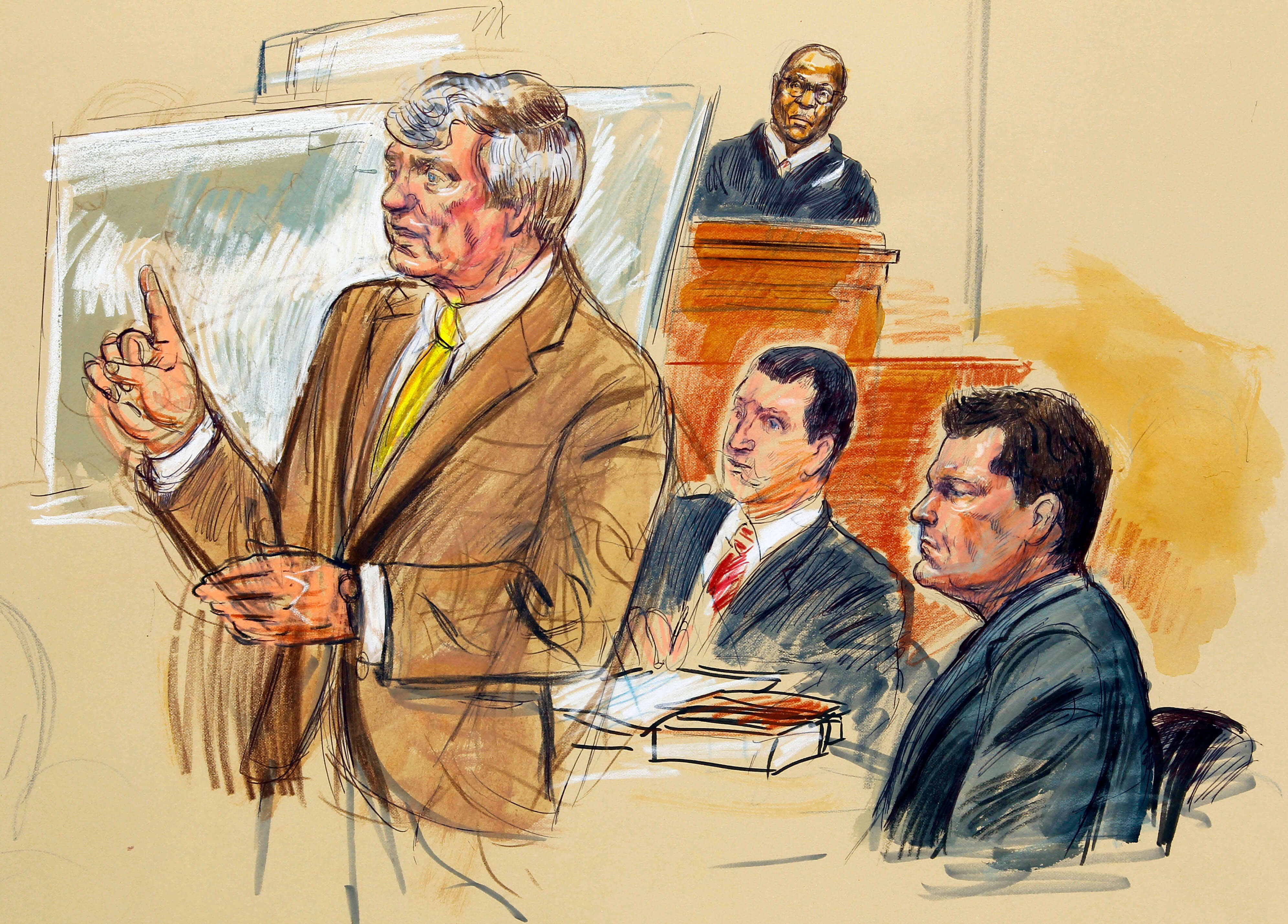
 Under the Fifth and Sixth Amendments, a criminal suspect is guaranteed the right to counsel. But there’s a difference between what the two amendments provide. The Fifth Amendment right to counsel was created by the Supreme Court decision in Miranda v. Arizona, where the Court held that a person has the right to have counsel present during custodial interrogation (interrogation counsel). The Sixth Amendment guarantees a defendant the assistance of counsel for his defense at trial (trial counsel).
Under the Fifth and Sixth Amendments, a criminal suspect is guaranteed the right to counsel. But there’s a difference between what the two amendments provide. The Fifth Amendment right to counsel was created by the Supreme Court decision in Miranda v. Arizona, where the Court held that a person has the right to have counsel present during custodial interrogation (interrogation counsel). The Sixth Amendment guarantees a defendant the assistance of counsel for his defense at trial (trial counsel).
Over the past four decades, the jurisprudence concerning the Fifth Amendment right to counsel during police interrogation (interrogation counsel) and the Sixth Amendment right to counsel at all critical stages of criminal proceedings (trial counsel) had become intertwined in complex and confusing ways. It was increasingly difficult for courts to determine which right can be invoked when and whether invocation of the right to counsel under one amendment invoked the right to counsel under the other amendment.
Pecina v. State, a recent Texas Court of Criminal Appeals case, illustrates the confusion that existed between the two rights to counsel. In Pecina, Arlington Police officers arrested the defendant for the murder of his wife and took him to the hospital rather than the jail because he had suffered significant stab wounds (allegedly self-inflicted). Because Mr. Pecina could not be transported to see a magistrate within 48 hours as required by the Texas Code of Criminal Procedure, the police officers brought a magistrate to him. A bilingual magistrate. The magistrate advised Mr. Pecina (in Spanish) of his Article 15.17 rights including, inter alia, the right to have an attorney present throughout the criminal trial process (i.e. trial counsel – 6th Amendment).
“After reading appellant his rights, [the magistrate] asked if he wanted a court-appointed attorney. And he stated that he did.” She then asked Mr. Pecina if he “still wanted to talk to [the detectives]?” He said that he did. The magistrate (as she later testified) believed that, when Mr. Pecina asked for counsel, he was asking for trial counsel, not interrogation counsel. The two detectives then entered the hospital room and issued Mr. Pecina his Miranda warnings (in Spanish). Mr. Pecina waived his Miranda rights, did not request an attorney, and gave a statement. He was later convicted for murder after his statements to the detectives were admitted against him at trial.
These facts raise important questions:
When Mr. Pecina told the magistrate that he wanted a court-appointed attorney, did he invoke his rights under both the 5th and 6th Amendments? Should the police have refrained from initiating further questioning until he had an attorney present?
Prior to the 2009 Supreme Court decision in Montejo v. Louisiana, 556 U.S. 778, the controlling case regarding the two intertwining rights to counsel was Michigan v. Jackson, 475 U.S. 625 (1986). “In Michigan v. Jackson, the Supreme Court had held that ‘if police initiate interrogation after a defendant’s assertion, at an arraignment or similar proceeding, of his right to counsel, any waiver of the defendant’s right to counsel for that police-initiated interrogation is invalid.’”
Under Michigan v. Jackson, Mr. Pecina’s assertion of his right to counsel that he made to the magistrate in the hospital would have been enough to preclude the police from initiating further interrogation. Or, if the police did later initiate interrogation, any statement Mr. Pecina made should have been suppressed at trial.
But all of that changed under Montejo in 2009. In Montejo, the Supreme Court disentangled the right to interrogation counsel with the right to trial counsel.
Distilled to its essence, Montejo means that a defendant’s invocation of his right to counsel at his Article 15.17 hearing says nothing about his possible invocation of his right to counsel during later police-initiated custodial interrogation. The magistration hearing is not an interrogation event.
Analyzing the Pecina case in the wake of Montejo, the CCA explained that “[i]n this case, there were two separate events: magistration followed by a custodial interrogation.” The CCA then held that “under the totality of the circumstances…an objective and reasonable police officer, conducting a custodial interrogation would conclude that appellant had voluntarily waived both his Fifth and Sixth Amendment rights to counsel for the purposes of custodial questioning.”
The CCA went further to clarify the new rule, explaining that under the Supreme Court decisions in Montejo, Miranda, Edwards, and Minnick, a suspect’s Fifth Amendment rights (to interrogation counsel) are only triggered “AFTER THE POLICE INFORM HIM OF HIS RIGHT TO COUNSEL AT THE BEGINNING OF A CUSTODIAL INTERROGATION.” Emphasis added. Ultimately, the CCA held that the magistration hearing (in which Mr. Pecina requested an attorney) did not trigger any Fifth Amendment right concerning custodial interrogation; that, the CCA explained, was done by the detectives at the beginning of their interrogation.
PRACTICE NOTE: A criminal defendant/suspect must now request an attorney, unequivocally, at every stage of the criminal justice process. Interrogation. Arraignment. Magistration. Every stage. This is a significant change in Texas criminal procedure.
Judge Alcala joined the majority opinion but wrote a separate concurring opinion, in which she notes:
The magistrate’s interpretation (that Mr. Pecina only requested trial counsel and not interrogation counsel) misses the whole point of the warning, which is the right to have an attorney present ‘during any interview with peace officers.’ I conclude that the record indisputably shows that appellant’s request for an attorney was a request to have an attorney present during interrogation, as well as during court proceedings. …Appellant’s request for an attorney was, at most, a pre-invocation of his right to counsel.
Judge Alcala believes that the “Legislature could easily fix [the confusion between the two rights to counsel] by adding one sentence to the Article 15.17 admonishments: ‘If you desire to have an attorney present during police interrogation, you must make that request at the time of the police questioning.’”
Judge Price dissented, opining that “[a]ny reasonably objective viewer would conclude from the peculiar facts of this case that [the magistrate] was acting as a de facto agent of the interrogating detectives.” He went further:
That the invocation [of Mr. Pecina’s rights] also occurred during a simultaneous “magistration,” while accurate, does not detract from its essential character for Fifth Amendment purposes. And once a suspect has made it clear that he desires the assistance of counsel in coping with police interrogation, we are not entitled to look at his subsequent responses to official entreaties “to determine in retrospect whether the suspect really meant it when he unequivocally invoked his right to counsel.”
Judge Price believes that Mr. Pecina’s Fifth Amendment right to interrogation counsel was violated. I agree.


 In a recent case from the U.S. Court of Appeals for the Fifth Circuit (Federal), the court considered whether police interrogation of a suspect violated the suspect’s constitutional right to an attorney when the suspect voluntarily continued the conversation with the officers.
In a recent case from the U.S. Court of Appeals for the Fifth Circuit (Federal), the court considered whether police interrogation of a suspect violated the suspect’s constitutional right to an attorney when the suspect voluntarily continued the conversation with the officers.





